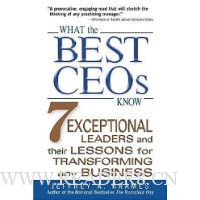
基本信息出版社:McGraw-Hill Education - Europe
页码:250 页
出版日期:2005年09月
ISBN:007146252X
条形码:9780071462525
版本:1
装帧:平装
开本:20开 Pages Per Sheet
外文书名:最好的首席执行官需要知道什么
内容简介 Book Description
A 2002 Library Journal Best Business Book of the Year
The bestselling book that teaches you leadership lessons from top captains of industry
What the Best CEOs Know examines the careers of seven CEOs, world-renowned for their consistent and phenomenal success, and details the methodologies that propelled them to the top as industry leaders. Going beyond anecdotes and quotes to introduce proven methods to help you become a better leader, bestselling business author Jeffrey Krames uses cases, self-assessments, and concise summaries to provide a blueprint-like framework for success.
“Helps you apply the lessons gleaned from these masters.”
—Forbes
From Publishers Weekly
In his opening remarks, Krames identifies the "celebrity CEO." This person is the company leader who's "idealized, even idolized," whose image graces magazine and book covers, and who is often asked to weigh in on the issues of the day. Celebrity CEOs ran wild in the 1990s and early 2000s. Alas, says Krames, v-p and publisher of McGraw-Hill's business books division, the celebrity CEO's era has ended. But some champion CEOs of that time do have wisdom to impart, and in this thorough and thoughtful examination of successful leadership strategies, Krames dissects the ideas of some of the biggest names that have graced business headlines in the past 10 or so years. The list is impressive: Michael Dell (Dell Computer), Jack Welch (GE), Lou Gerstner (IBM), Andy Grove (Intel), Bill Gates (Microsoft), Herb Kelleher (Southwest Airlines) and Sam Walton (Wal-Mart). Although only one of the subjects still holds the CEO title, all seven have implemented world-famous success methods. Krames pinpoints their defining traits (e.g., they are evangelical, but not necessarily charismatic) and strategies (e.g., prepare for change; foster learning), using specific examples and quotes. Sidebars (entitled "What Would Andy Grove Do?"; "What Would Jack Welch Do?" etc.) break up the text. This is a smart, timely book that deserves reading for the lessons it teaches and for the business history it inadvertently imparts.
From Booklist
Do seven of the most admired, most studied, and most quoted CEOs in the twenty-first century have no new knowledge to impart about their successes? Krames has created a new spin for the lessons from names such as Michel Dell and Jack Welch (plus five others) by fashioning a case-history-like approach. He sets the stage by isolating the six traits critical to great CEO success, from instilling a company-wide outside-in perspective to understanding the role of culture and how difficult it is to bring about meaningful cultural change. Then each of the seven CEOs is "assigned" a specific lesson. For example, Southwest's success in creating a performance-driven culture is introduced by a fictional business problem, headlined "What Would Herb Kelleher do?" and followed by a history of the airlines, the problem's answer, additional questions, and a synopsis of points to remember. Post-Enron, any corporate captain of industry can be tarnished; on the other hand, these lessons could remain valuable for years to come. Barbara Jacobs
Book Dimension
length: (cm)21 width:(cm)13.7
作者简介
Jeffrey A. Krames is the bestselling author of numerous books and has written for the New York Times, the Wall Street Journal, and the Los Angeles Times.